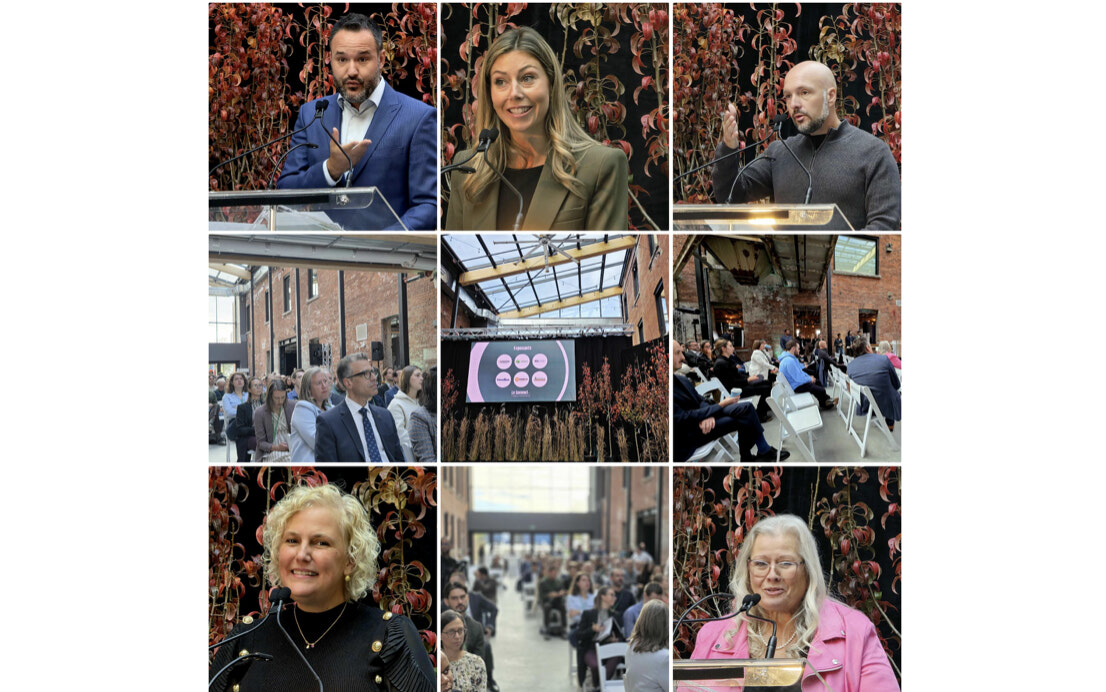
At the first Sommet Climat Outaouais on October 17 in Gatineau, hundreds of local leaders launched more than $2 million in climate commitments and a regional energy transition push, with the morning introductions featuring (in order) Mathieu Lacombe, Maude Marquis-Bissonnette, Simon Desjardins, Josée Lusignan, and Murielle Laberge. Photo: Tashi Farmilo
Outaouais' climate takes centre stage at summit: Gatineau to protect over 95% of wetlands
Tashi Farmilo
The first climate summit in the Outaouais region brought together hundreds of local leaders in Gatineau on October 17 for the Sommet Climat Outaouais. The landmark gathering united public, private and community voices behind urgent climate action and unlocked more than $2 million in new local commitments to support a coordinated regional response to the climate crisis.
Organized by the Partenariat Climat Outaouais (PCO), an independent coalition of public institutions and organizations, the summit welcomed mayors, ministers, academics, Indigenous leaders, non-profits and entrepreneurs for a full day of panels, workshops and announcements. The shared goal was to accelerate the region’s transition to a low-carbon, climate-resilient future.
Among the day’s key announcements was $541,000 in funding from the Government of Quebec to develop the region’s first energy transition plan. Led by environmental organization CREDDO, the plan will chart a path to decarbonize energy systems, improve efficiency and implement solutions tailored to the Outaouais. The Université du Québec en Outaouais (UQO), a founding member of the PCO, also announced a $520,000 investment in solar panels, EV chargers and secure bicycle shelters across its campuses, along with expanded sustainable transportation programmes. The municipalities of La Pêche and Chelsea confirmed the expansion of a hybrid car-sharing programme, and the City of Gatineau shared plans to preserve over 95 per cent of its wetlands.
ID Gatineau launched a new $500,000 fund to support small and medium-size businesses in reducing their environmental footprint. Several local businesses present at the summit shared how they are cutting emissions through electrified equipment, reduced construction waste and support for food security and recycling efforts.
The summit’s programming covered a wide range of climate topics. The agenda included a business panel on sustainable practices, a solar energy conference, workshops on decarbonizing buildings and land use planning, and sessions focused on climate data, regional planning and the socio-ecological transition. Participants also joined networking events and explored exhibits featuring local innovations and solutions.
Mayor Maude Marquis-Bissonnette told attendees the crisis is already close to home. “So, I’m proud, really proud, that Gatineau is committed. We want to act with ambition.” Speakers throughout the day also emphasized that the climate challenge is a social one, calling for equity, knowledge-sharing and Indigenous leadership.
The summit also served as a launchpad for the PCO’s next phase of work. Over the coming months, three regional working groups will focus on decarbonizing buildings, rolling out the regional energy plan and rethinking mobility and land use to reduce emissions and increase resilience.
Murielle Laberge, rector of UQO and co-president of the PCO, urged participants to stay focused on what truly matters. “This transition isn’t just about infrastructure or policies or technology,” she said. “We have to remember why we’re doing this. It’s about life itself.”
